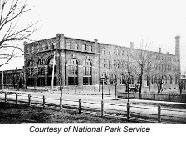|
 The First Lady begins the second day of her
treasures tour in West
Orange, New Jersey, at the Thomas Edison Invention Factory. The factory
is actually a complex of several buildings including a chemistry
laboratory, machine shop, movie studio replica and library where Edison
did his research for 44 years. The First Lady begins the second day of her
treasures tour in West
Orange, New Jersey, at the Thomas Edison Invention Factory. The factory
is actually a complex of several buildings including a chemistry
laboratory, machine shop, movie studio replica and library where Edison
did his research for 44 years.
Edison was one of the nations most prolific inventors, over half of his
1,093 patents were earned from the 44 years of work at this invention
factory which he opened in 1887. The worlds first building constructed
as a motion picture studio, the Black Maria, was part of the laboratory
complex from 1893 until 1903. Not only did Edison continue to invent
things at this site but it was this invention laboratory that initiated
the idea of Research and Development as a component of business. The
site implemented new management techniques like punching a time clock
(which Edison did). Research shows that a 55 hour work week was the average.
Preservation needs: This site houses over 400,000 artifacts and 5
million
pages of paper, including Edison's letters and lab notes, and the first
structure built for motion picture filming. Edison's prototypes,
valuable notes, and photographs are decomposing because they lack proper
storage and climate control, and many are close to being lost before
being catalogued. A new visitors center is proposed to adequately house
the artifacts and papers, provide an auditorium and upgrade the education
program for the 85,000 visitors who visit the factory every year. Need to
restore labs to historical condition from office and storage space.
Facts about Edison: Thomas Alva Edison was born February 11, 1847 in
Milan, OH. He grew up there and in Port Huron, MI. As a child, he set
up a chemistry lab in the basement, but was not considered a good student
by teachers so he relied on his mother and himself for education. Edison
also lost much of his hearing in youth.
Edison learned how to use a telegraph while working with a station master
and this knowledge allowed Edison to work around the country as an
operator. His first patent was for the electric vote recorder but no one
was interested in buying it so his focus became commercially viable
inventions. His first commercial invention was an improvement of the
stock ticker. In 1877 he invented the phonograph and in 1878, the
electric light.
Profits from motion pictures and the phonograph kept him in business
during the 1890's when he lost millions on an iron ore mine in New Jersey
which used machines to crush boulders and magnets to draw out the ore.
The invention worked but was not commercially viable due to its cost.
In December 1914, fire sweeps through most of the West Orange factories
but they were rehabilitated and work continued. By 1925, half of the
people living in cities were using electric power in their homes. In
1928, Congress awarded Edison a special honorary medal. Thomas Edison
died October 18, 1931. Edisons most famous quote is Genius is 1%
inspiration and 99% perspiration.
|

